Key takeaways:
- Calorie counting enhances awareness of eating habits, improving portion control and nutritional knowledge, leading to healthier choices.
- Essential tools for effective calorie counting include a food scale, mobile apps for logging meals, and nutrition guides for checking calorie content.
- Sustaining long-term calorie counting relies on celebrating small victories, embracing meal diversity, and fostering community support for motivation and accountability.
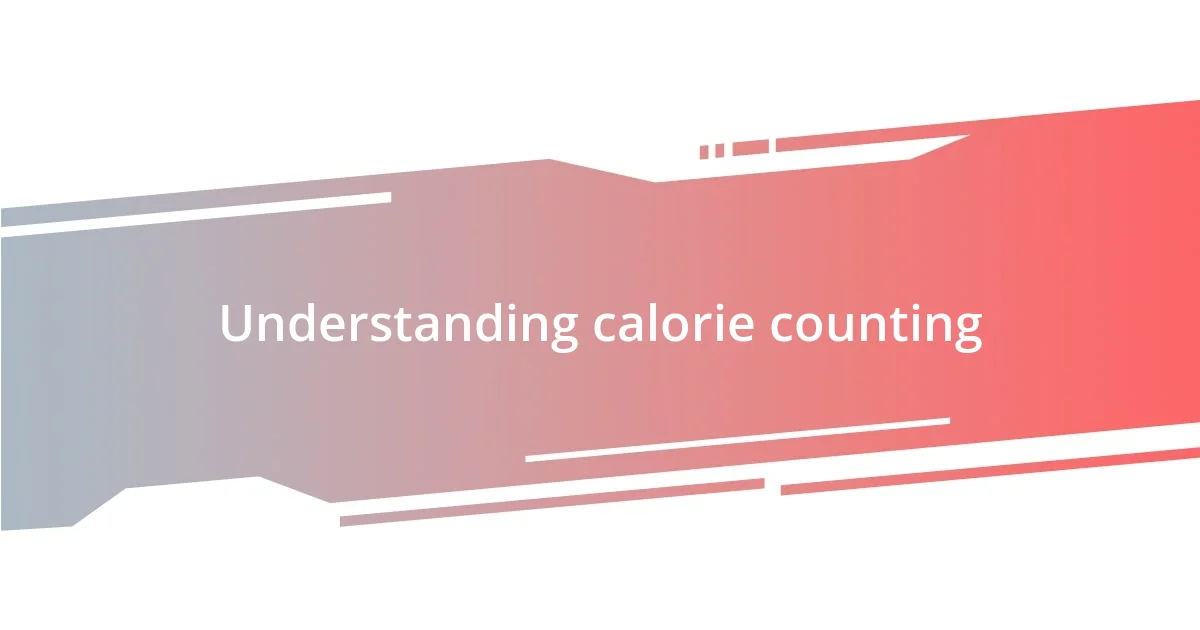
Understanding calorie counting
Calorie counting can often seem daunting at first, but it’s really just a way to understand what we’re putting into our bodies. I remember my initial struggle; I was overwhelmed by all the numbers and how they didn’t always feel intuitive to me. Have you ever felt lost in a sea of nutritional labels, wondering if you’re making healthier choices or just fooling yourself?
When I started counting calories, I quickly learned it wasn’t just about the numbers; it was about understanding the nutritional value of what I was eating. Every calorie represents energy, but it also comes with a package of nutrients—or sometimes a lack thereof. I found myself emotionally connected to foods I enjoyed but realized they didn’t fuel my body like I thought. This shift in perspective helped me choose foods that not only satisfied my cravings but also aligned with my health goals.
I often ask myself why we don’t talk more openly about calorie counting—it feels like a secret club. The reality is, each bite we take contributes to our energy intake, and being aware of it can empower us to make better choices. Embracing this practice taught me more about balance than restriction. And isn’t that what we all seek—finding joy in our food while still caring for our health?
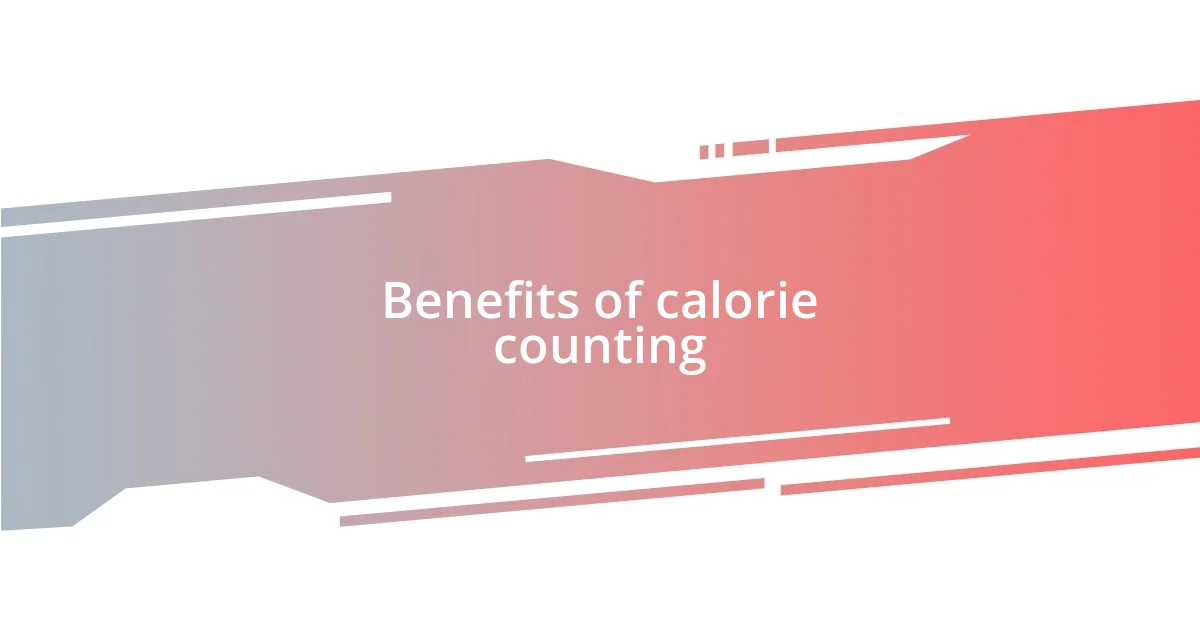
Benefits of calorie counting
One of the most rewarding aspects of calorie counting, in my experience, is the increased awareness it brings to your eating habits. Initially, I was shocked to realize how easy it was to underestimate the calories in my favorite snacks. By paying attention to these numbers, I found myself making more mindful choices and learning to savor my meals, rather than mindlessly munching.
Here are some benefits I’ve experienced from calorie counting:
- Improved Portion Control: I became more aware of serving sizes, helping me manage portions more effectively.
- Enhanced Nutritional Knowledge: Understanding the nutritional value of different foods allowed me to choose healthier options.
- Support in Achieving Goals: Whether it was weight loss or simply feeling more energized, calorie counting provided a structured method to track progress.
- Boosted Accountability: Keeping a food diary made me more accountable to myself, reinforcing my commitment to healthier eating.
Reflecting on my journey, I also found that calorie counting can turn eating into a more positive experience. Instead of feeling restricted, I learned how to incorporate my favorite foods while still keeping an eye on my overall intake. It transformed my mindset from “I can’t eat that” to “I can enjoy this in moderation.” Who wouldn’t feel empowered by that shift?
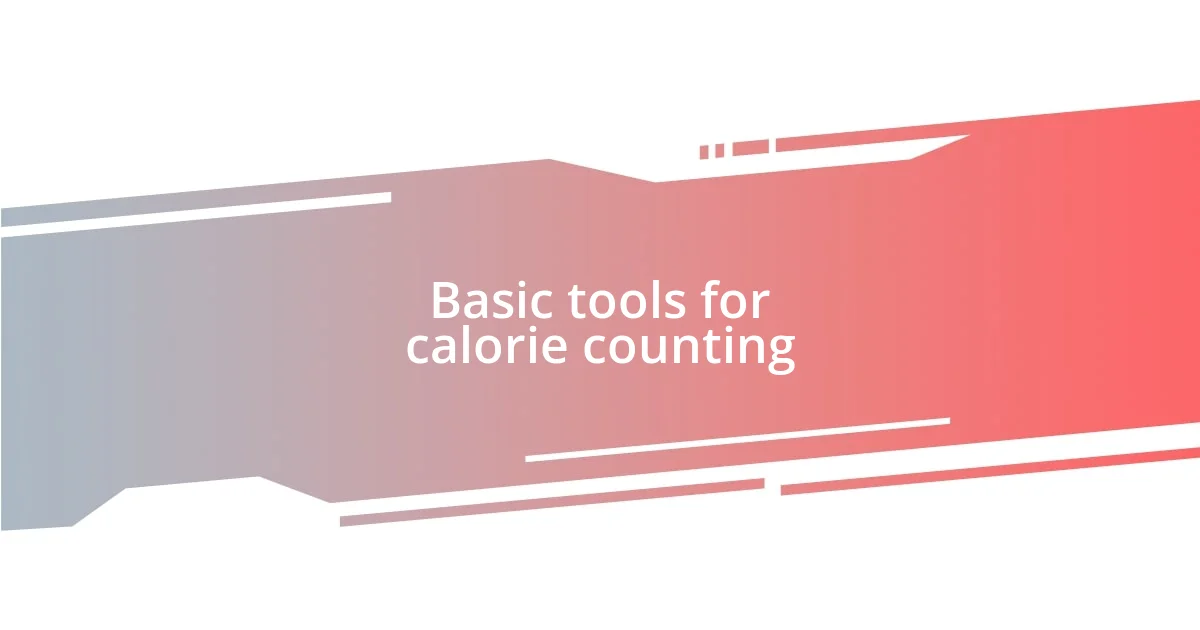
Basic tools for calorie counting
Calorie counting starts with some essential tools that can help simplify the process. I found that using a food scale was a game changer for me. It allowed me to accurately measure portions, which I initially underestimated. The first time I weighed a serving of pasta, I was shocked at how much more I was eating than I thought! Having a scale made me more mindful of my portions and gave me a clearer picture of my intake.
Mobile apps are another fantastic resource for calorie counting. There are several user-friendly options out there that allow you to log meals easily. I remember downloading my first app and being surprised by how convenient it was to search for foods and track what I ate. This technology not only simplifies the counting but also often provides nutritional insights and suggestions. Plus, seeing my progress over time felt incredibly motivating.
Lastly, having a reliable nutrition guide or a calorie database can be invaluable. When I first started, I relied on printed guides to help me understand the calorie content of various foods. Now, I often refer to online resources for quick info. This tool not only supports my education on food choices but also reinforces my commitment to healthier eating habits.
| Tool | Description |
|---|---|
| Food Scale | Helps measure accurate portion sizes, ensuring better tracking of calorie intake. |
| Mobile Apps | User-friendly platforms that allow easy logging of meals and tracking of nutritional information. |
| Nutrition Guide or Database | A resource for checking calorie content of various foods, aiding in informed decision-making. |

How to read food labels
Reading food labels can initially seem daunting, but the information they provide is incredibly valuable for calorie counting. I distinctly remember the first time I scrutinized a label; it was like uncovering a hidden world of information. The key components to focus on are the serving size, calories per serving, and the nutritional breakdown. By comparing the serving size to the amount you actually eat, you can quickly see if you’re consuming more (or less) than you realized.
One thing that surprised me about food labels was the presence of hidden sugars and fats. For instance, I used to grab what I thought were healthy granola bars, only to find out later that they were packed with added sugars. Reading labels taught me to look beyond marketing claims and spot ingredients that didn’t align with my nutritional goals. Have you ever found a “healthy” snack that turned out to be anything but? It’s eye-opening!
Lastly, don’t forget about the % Daily Value (DV) listed on the label. I learned that this percentage helps gauge how much of a specific nutrient you’re getting based on a 2,000-calorie diet. For me, seeing that a food was high in fiber or low in saturated fats was encouraging. It’s a reminder that calorie counting is about more than just numbers; it’s about making choices that nourish my body. The more I learned about reading labels, the more empowered I felt to take charge of my health.
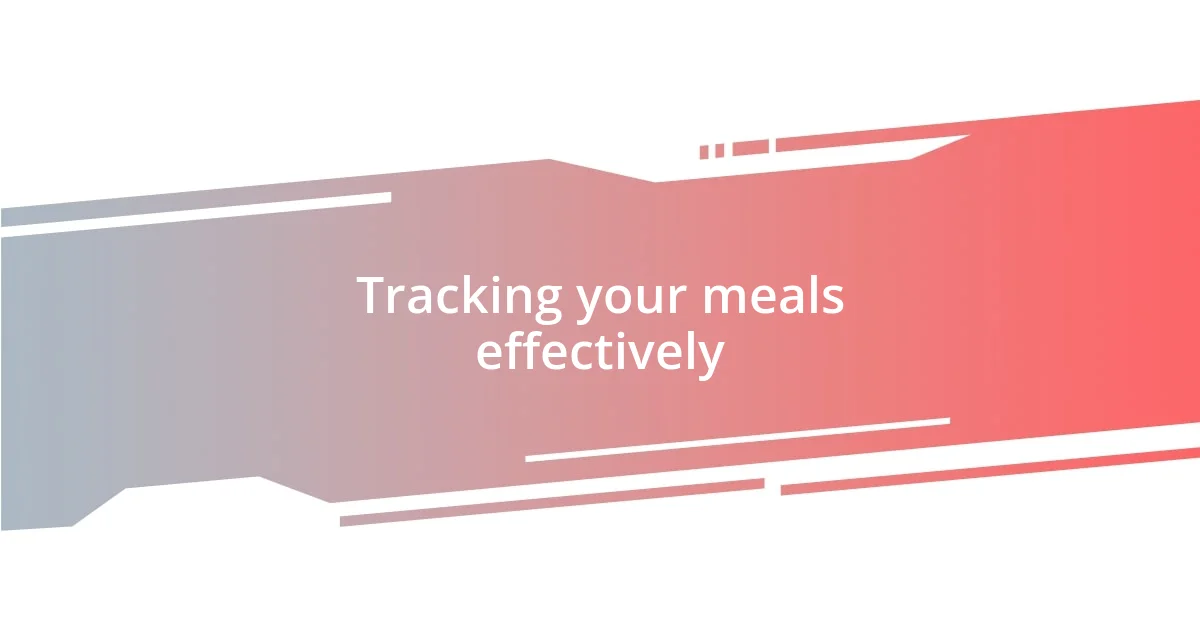
Tracking your meals effectively
Tracking your meals effectively is a key component of successful calorie counting. In my experience, keeping a consistent log is what really made the difference in understanding my eating habits. Initially, I struggled with remembering what I ate throughout the day but discovered that jotting down my meals in a notebook helped me remain accountable. Have you ever noticed how easily we forget those little snacks we grab? Writing everything down made it all too real for me, and I was often shocked by the cumulative calorie count.
Another effective method I adopted is to take pictures of my meals. This little habit has proven to be not only fun but also enlightening. I remember snapping a quick photo of a colorful salad I made one afternoon. When I looked back at the images later, it struck me how much variety I could build into my meals while still tracking my calories. It served as a visual reminder of my journey—both the progress I made and the moments when I indulged a bit too much. Have you ever thought how our meals tell a story about our choices? It’s fascinating to reflect on!
Finally, incorporating a weekly review of my meal logs has been crucial. Setting aside time each week to analyze what I’ve eaten helps me identify patterns in my diet. It’s during these reviews that I discovered how my emotional state influenced my food choices. I found myself reaching for more snacks during stressful weeks. Recognizing this made me more conscious of my emotional eating. By understanding these habits, I’ve learned to better navigate my nutritional needs, improving how I manage my caloric intake day by day.
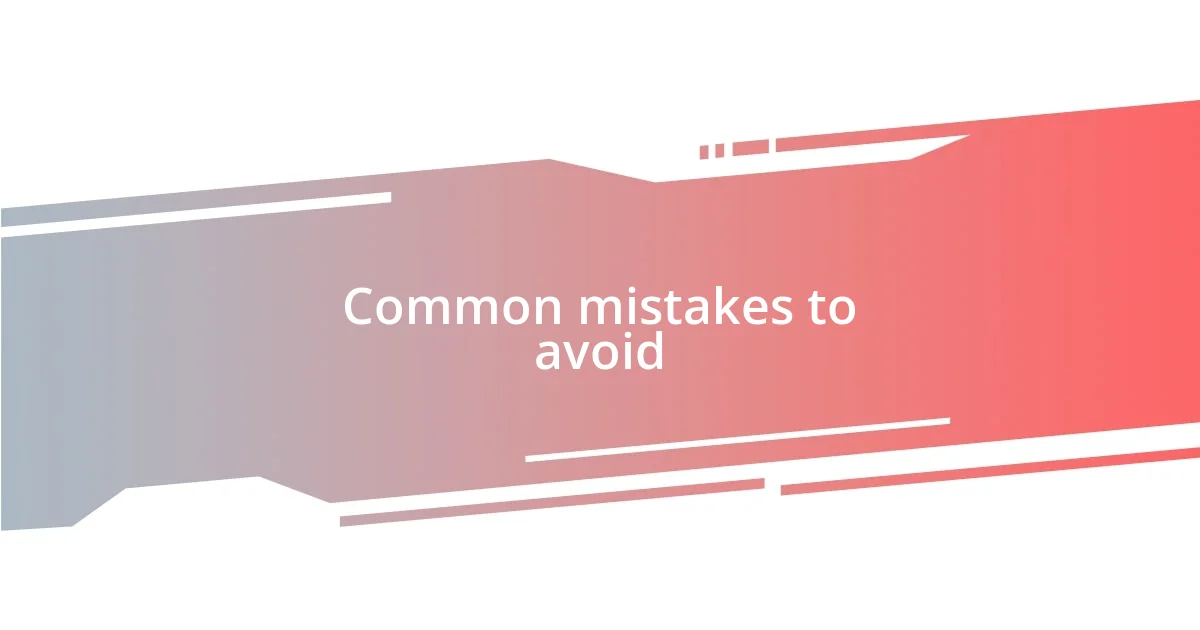
Common mistakes to avoid
Avoiding common mistakes in calorie counting can significantly impact your journey. One major pitfall I’ve encountered is neglecting those seemingly innocuous snacks or sips throughout the day. When I first started counting calories, I often overlooked my beloved afternoon coffee splashed with cream and sugars. It took a while for me to realize that those extras added up quickly, skewing my daily total. Have you ever been surprised by how much a few small choices can impact your overall intake?
Another mistake people make is relying solely on food tracking apps without verifying the accuracy of their entries. I remember once entering a homemade dish without weighing or measuring the ingredients. The app suggested a calorie count that was far off from reality, leaving me puzzled when the scale didn’t budge. It’s essential to remember that some apps may not have the exact data for every recipe, so taking an extra moment to confirm can save you from unnecessary frustration.
Finally, a mistake I see often is setting overly ambitious calorie targets without considering individual needs. Early in my tracking process, I aimed for a drastically low intake to shed pounds quickly. I quickly discovered that this approach left me exhausted and craving everything in sight. Instead, I learned to focus on a balanced, sustainable plan that fit my lifestyle. Have you ever set a goal that felt almost impossible to maintain? Shifting to realistic targets transformed my mindset and ultimately led to more consistent progress.
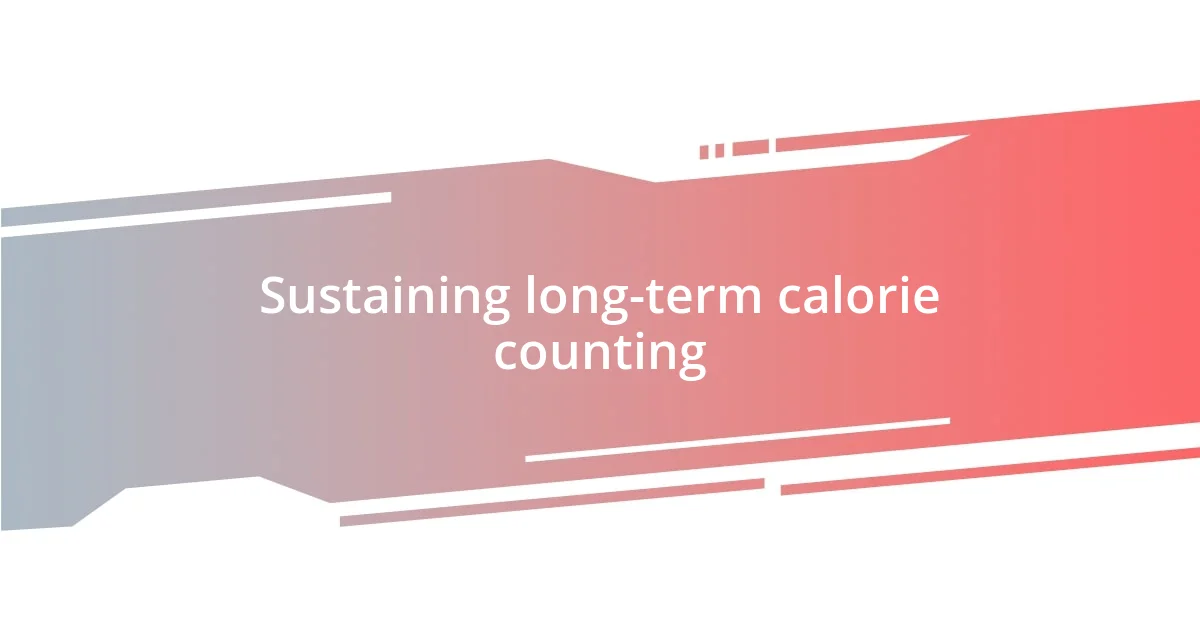
Sustaining long-term calorie counting
Sustaining long-term calorie counting requires a mindset shift that goes beyond numbers. I’ve found that it’s essential to celebrate small victories along the way. For instance, instead of fixating solely on weight loss, I focus on how the choices I make make me feel. I remember feeling a sense of accomplishment when I prepared a week’s worth of healthy meals on a Sunday. It felt less like a chore and more like an investment in my health—doesn’t that feeling of preparation spark joy?
One of the biggest hurdles I faced was the monotony of counting calories. I realized early on that spice and diversity in my meals weren’t just good for my palate; they were crucial for my motivation. Experimenting with new recipes became a playful challenge for me, and I learned to cherish the process. Have you ever tried cooking a delightful dish that kept you savoring every bite? It makes the counting feel less restrictive and more enjoyable.
Another key factor in sustaining long-term calorie counting is the importance of community and support. Sharing my journey with friends or finding online groups provided me with not only accountability but also encouragement. I recall one week when I experienced a major setback, feeling discouraged and ready to give up. But a supportive friend reminded me of my progress and the strength I gained from persistence. Have you ever leaned on someone when you felt like the journey was too tough? That support can really reignite your passion for your goals.















